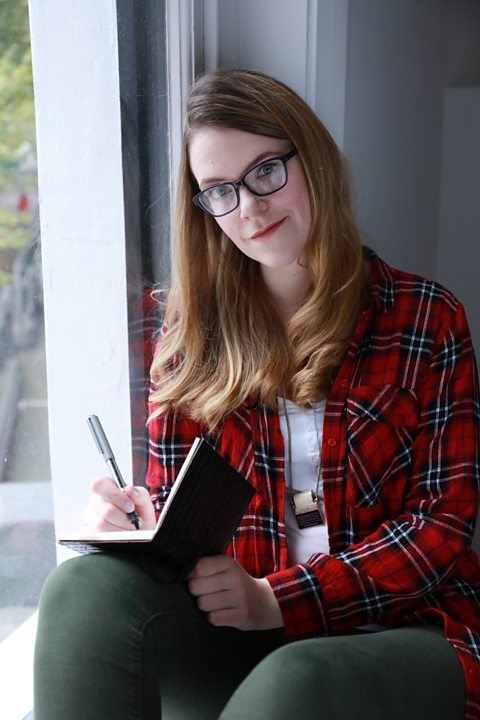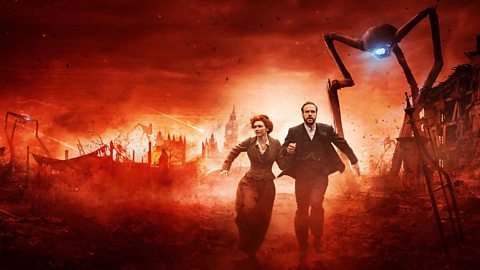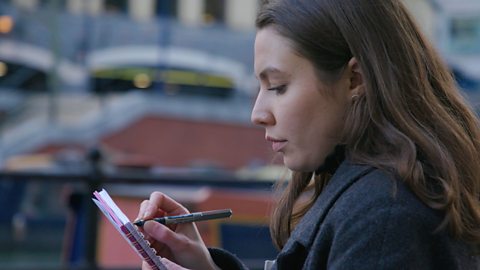If you have ever dreamed of writing for a living, you may be wondering how a novel makes the journey from a writer’s imagination to publication.
Getting a job as an author isn't necessarily about filling in an application form and keeping your fingers crossed for an interview. Instead, it’s down to an up-and-coming writer to get their work noticed, in the hope that a publisher will take them on. It may sound a tricky task, but one author who has broken through is Sarah Ann Juckes, the writer behind Outside and The World Between Us. She shared her own story with BBC Bitesize, as well as some advice for anyone wanting to see their own stories published in future.

We need to hear your voice
I was 16-years-old when I wrote my first novel. Flash forward a decade or so, and my second novel for young adults publishes on World Book Day 2021. So how did I get here?
The first thing to know is that you can become an author whatever your background and circumstances. That’s really important, as the world of literature needs diverse voices. You don’t need a university degree to write, although studying English or Creative Writing can help. You can also learn the craft of writing using free online advice resources; by experimenting with your own writing; and by reading everything you can get your hands on.
That being said, it can take years of hard work and perseverance to get a publishing deal. My top tip is to start out writing short stories or flash fiction and entering them into competitions. I didn’t get that first novel I wrote published, but I did win a short story competition when I was 21 that was published in an anthology, and it gave me such a boost in confidence. You can find competitions with a simple online search, and there are plenty of free-to-enter ones you can try.
Rejection isn't a bad thing
Once you’ve mastered short-form writing, you might want to try your hand at writing books. I wrote three novels before my debut was published, so this leads me to my second top tip: don’t be afraid to fail.
Rejection is an inevitable part of being a writer. I amassed well over 50 rejections before I got a deal – and I’m still getting them now! The way I deal with them is to print my rejection emails off and stick them in a scrapbook titled ‘How I Made it as a Writer’. If you think of your life like an adventure story – the hero always experiences setbacks before they live happily ever after. And it’s the same with writing.
To get a deal with a large publisher, you first have to sign with a literary agent. Literary agents are wonderful, as they can link you up with publishers and give you much-needed advice on your career. But – they’re really hard to get. Some agents receive over 2,000 new writer submissions a year and may only sign one or two of those. Eeek!
It’s hard – but not impossible. You can help yourself again by learning how to write a professional agent query letter. The most important thing is that you keep trying. Keep learning from your rejections, keep reading everything and – of course – keep writing.

Perseverance can pay off
It took me 12 years to sign with a literary agent, but once I did – everything then happened fast. I signed a publishing deal and I now have two books out in the world (some in different languages!) Seeing my book in the shops for the first time felt like a dream come true – but all the more special to be a dream I’d made happen by working hard and not giving up.
Being a published author means I’m always working on a new story. I now write first drafts in just a few weeks and spend the rest of the year editing them. I squeeze writing in between working my day job (yep – most authors still have other careers!), doing events with schools and chatting to other authors.
It’s a challenging job, but also one of the most rewarding things you can do – especially if you love storytelling as much as I do! And when you read comments from readers who’ve enjoyed your work – it makes it all that hard work worth it.

Writing War of the Worlds for the 21st Century
Writer Peter Harness on the responsibility of adapting HG Wells' sci-fi classic

How to become a writer. collection
A collection of writer job profiles and information about what the role entails.

Study Support Podcast
In this BBC Sounds Podcast Ibz Mo looks at some of the techniques you can use to help study smarter in school or at home.
